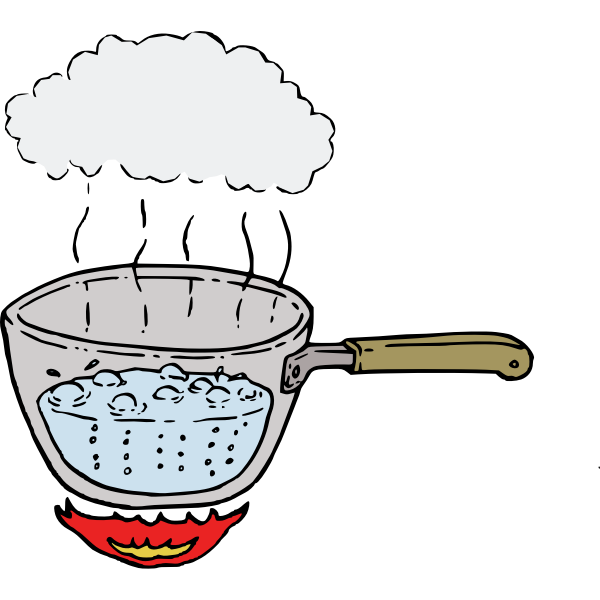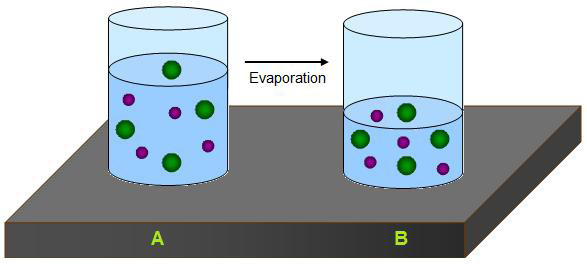Boiling and Evaporation both are phenomena where a liquid changes its state from liquid to vapor. Both these processes differ from each other in specific ways & different factors affect their rate.
Let’s find out how they are defined and what are factors which make the difference between boiling and evaporation.
Index
What is Boiling?

Boiling is a rapid vaporization of the liquid when it is heated to its boiling point.
Example: Water boils at \(100^{\circ}\) C at sea level and gets converted to vapor form from water.
The boiling point of a substance is the temperature when the vapor pressure of the liquid is equal to the surrounding pressure, and at this temperature, the liquid changes to vapor.
Related Topic: Critical Point
Factors Affecting Boiling
Some factors may affect the boiling temperature of the liquid. Let’s have a look at those factors.
Atmospheric Pressure
The boiling point of a liquid depends upon the surrounding pressure. With the increase in atmospheric pressure, the boiling point will increase since it will need more energy for breaking the inter-molecular bonds and change to the vapor state.
We can say that;
Boiling Temperature \(\propto\) Surrounding Pressure
I.e., if the surrounding pressure increases, the boiling point will also increase & vice-versa.
Impurities
As impurities are added to the substance, the boiling point tends to increase (in rare cases, the boiling point may decrease). Therefore, if take an example of water that boils at \(100^{\circ}\) C at sea level, on the addition of impurities, the boiling point or temperature may increase.
What is Evaporation?
Evaporation is a surface phenomenon where the liquid at the surface or the layer exposed to the surroundings changes its state from liquid to vapor.
The molecules of the liquid are in constant motion, so as they collide, they transfer energy to each other based on their collision. When a molecule near the surface has absorbed enough energy to overcome the vapor pressure, it changes phase to vapor and enters the surrounding air as a gas.

Factors Affecting Evaporation
Some factors may affect the evaporation temperature of the liquid. Let’s have a look at those factors.
Surface Area
Evaporation is a surface phenomenon. If there is an increase in the surface area, the rate of evaporation also increases.
Example: When we spread out wet clothes, it dries off faster than those kept folded.
We can say that;
Rate of Evaporation \(\propto\) Surface Area
Temperature
The rate of evaporation increases with the temperature. This happens due to the higher kinetic energy of molecules at higher temperatures, leading to more transfer of heat and faster evaporation of surface molecules.
Example: Clothes dry faster under sunlight than in the shade.
We can say that;
Rate of Evaporation \(\propto\) Temperature
Humidity
Humidity is the amount of water vapor present in the air. Air can hold only a certain amount of water at the given temperature.
As the amount of water holding increases in air, the rate of evaporation decreases.
We can say that;
Rate of Evaporation \(\propto\) \(\frac{1}{\text{Humidity}}\)
Wind Speed
Wind speed also affects Evaporation, as the particle of water will move away with wind reducing the amount of water present in the air.
Example: Clothes dry faster on a windy day.
We can say that;
Rate of Evaporation \(\propto\) Wind Speed
Difference Between Boiling and Evaporation
Here’s the comparison table which shows the difference between boiling and evaporation.
| Sr. No. | Boiling | Evaporation |
| 1. | Vapor pressure must be equal to the surrounding pressure, leading to a state change from liquid to gaseous. | Molecules of liquid collide, transferring energy; when surface molecules have enough energy to overcome pressure, they change state from liquid to gaseous. |
| 2. | Boiling happens at boiling point(depends on surrounding pressure). | Evaporation takes place at all temperatures. |
| 3. | Boiling involves a full volume of liquid. | Evaporation is a surface phenomenon. |
| 4. | Boiling is a fast process. | Evaporation is a fast process. |
| 5. | Boiling occurs only when external heat is applied to the liquid. | Evaporation is a continuous process and does not require an external heat source like boiling. |
Questions
Question 1. What is Evaporation?
Answer. Evaporation is when a liquid changes its state from liquid to vapor without any external supplement of heat. It is a surface phenomenon.
Question 2. What is Boiling?
Answer. Boiling is when a liquid changes from liquid to vapor when an external heat source is added, and a full volume of liquid is heated.
FAQs
Evaporation is a surface phenomenon, while boiling is a phenomenon involving a whole volume of liquid.
Latent heat of vaporization is the little extra amount of heat required for the phase change.
Once the water reaches \(100^{\circ}\) C, the temperature stops increasing, and water changes to a gaseous state. That is the time when the molecules are absorbing latent heat of vaporization.
Factors affecting the boiling point of a liquid are;
1. Atmospheric Pressure
2. Impurities
Factors affecting the Evaporation of liquid are;
1. Surface Area
2. Temperature
3. Humidity
4. Wind Speed
